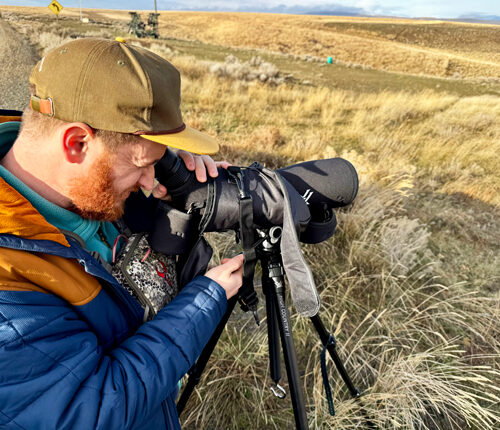Wildfires burning across the West have now attracted the attention of President Joe Biden and Vice President Kamala Harris. They asked Western governors on Friday: How can the federal government help?
The seven governors worried any spark could ignite a fire on the West’s parched landscape. In Oregon, Biden was specifically concerned about the Bootleg fire, which has destroyed more than 400 structures, including 160 homes.
“We can’t ignore how the overlapping and intertwined factors – extreme heat, prolonged drought and supercharged wildfire conditions – are affecting the country,” Biden said. “So this is a challenge that demands our urgent, urgent action … Not just today, but tomorrow, next year and the year after.”
In Washington, Gov. Jay Inslee said this wildfire season so far is shaping up to be four times worse than earlier seasons.
“There is only one way to prevent these forests from being gone in the next century, effectively,” Inslee said.
That’d be Inslee’s now-famous interest in climate solutions. During his roughly three-minute speech, Inslee pushed for federal clean energy policies and a civilian climate corps. The program could be modeled on President Franklin D. Roosevelt’s civilian conservation corps and similar to an initiative in California.
“Our own federal scientists have said, if we accept a 1 degree Centigrade (1.8 degree Fahrenheit) change, we’ll have a 600% increase in these fires on a regular basis. We won’t recognize these forests as forests anymore,” Inslee said.
Biden joked before the briefing started, “Jay, you’re beginning to convince the American people there is a thing called climate crisis. ‘Bout time.”
“Indeed,” Inslee said.
Biden held up maps, marked with fires in each state. He said he’s working with Congress to make sure firefighters are paid better permanently.
“We need more help,” Biden said. “Particularly when we also factor in additional nationwide challenges of pandemic-related supply chain disruptions and our ongoing efforts to fight Covid.”
The governors said there were too few people to fight fires, not enough fuel for aerial fire suppression, and a constant battle each year to access Pentagon satellites that help spot fires before they become too large.
Biden appeared to take notes as each governor spoke.
“That’s why we’re doing this,” he said to California Gov. Gavin Newsom. “I want to find out what’s the greatest concerns you have. When this meeting is over, I will be on the phone to the (U.S.) Department of Defense, and talking about the access to satellite capability.”
Newsom also noted what he called the “elephant in the room,” the time it takes U.S. Forest Service to initially respond to a fire. Newsom said a slow initial response time allows fires to grow to uncontrollable sizes.
“We had a fire, it was on federal property – 57% of forest property in California is federal. Just 3% is under California jurisdiction. There’s a culture that too often is wait and see. We can’t afford that any longer,” Newsom said. “That fire bled into Nevada.”
Fires are easier to manage when they’re small, said Montana Gov. Greg Gianforte, noting it shouldn’t matter in which jurisdiction the fire starts.
Gianforte said Montana has worked to address its “forest health crisis.” Forests in many areas are too dense and need to be managed with thinning, logging or prescribed burns across ownership boundaries, he said.
“To create meaningful, landscape-scale change,” Gianforte said. “It’s not up totally to us. We ask that our federal partners join us year-round to reduce the risk of catastrophic wildfires.”
Only comments from the first three governors to speak – Montana, Washington and California – were live-streamed.
An infrastructure deal now in the Senate includes “billions of dollars to strengthen wildfire preparedness, resilience and response,” Biden said. “It includes funding for prevention efforts, like forest management, and restoring millions of acres of high-risk management to protect homes and public water sources for drinking.”
Vice president Harris said she has previously faced evacuations at her home in California.
“Know that we are here to maximize the federal capacity to support the states,” she said. “Folks should not have to fear that they are going to lose their home, everything that they have, much less risk their lives in these moments.”


















